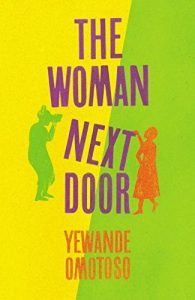 The Woman Next Door
The Woman Next Door
Yewande Omotoso
Chatto & Windus, 2017
Yewande Omotoso spoke to Johannesburg Review of Books editor Jennifer Malec recently about writing unlikeable characters, the necessity for discomfort in art, and her most recent novel, The Woman Next Door.
The Woman Next Door tells the story of two octogenarians living in Cape Town, one white, one black, who share a mutual loathing that develops into something of a ‘hateship’ as they are forced together by circumstance.
The novel—Omotoso’s United States debut—has been at the centre of a flurry of awards buzz, and was longlisted for the Baileys Women’s Prize for Fiction and shortlisted for the Sunday Times Barry Ronge Fiction Prize. It is currently on the shortlist for the University of Johannesburg Prizes for South African Writing in English.
Omotoso (who is on The JRB’s Editorial Advisory Panel) was born in Barbados and grew up in Nigeria, moving to South Africa with her family in 1992. Her debut novel, Bom Boy, published in 2011, won the South African Literary Award for First-time Published Author and was shortlisted for the Sunday Times Fiction Prize and the inaugural Etisalat Prize for Literature.
Jennifer Malec for The JRB: Afternoon, Yewande, thanks for agreeing to chat to us. The Woman Next Door is such a meaty book, I’m pleased to have the chance to chat about it with you.
Yewande Omotoso: Thank you for the interview.
The JRB: Good novels about old women are rare; I remember reading Rabih Alameddine’s An Unnecessary Woman a few years back and being astonished by the main character. It’s a pity we are so surprised when we find an interesting and non-tawdry female protagonist who is over 70. Why did you choose to write a story about older women, and how did you prepare to write it?
Yewande Omotoso: Early in 2012 my grandfather passed away and I travelled to Barbados to attend the funeral. I think this was around the time I started imagining Hortensia, although she wasn’t fully herself yet. I spent time with my grandmother, I thought a lot about what she was going through, her grief. In general I began to meditate on what it is like to be someone of her age; to have been married for over half a decade, to suddenly lose your life-mate. I also wondered what it was like to have most of your life behind you. I remember thinking how if that life had been unsatisfactory then the condition of your old age would surely be touched by that. Later I wanted to give Hortensia a worthy combatant, and I started to think about Marion.
In terms of preparation it’s hard to answer this simply. Many things form part of preparation: conversations, some of which I know while I’m having them that they are for the book, but many of which I’m not even aware of how they will ultimately impact what I write. Among the conscious, I set up several interviews. I felt lucky to sit and speak with women who had so much life behind them. I recall getting permission to spend an afternoon in a Jewish old-age home in Cape Town. I trailed through microfiche of the Argus and Cape Times newspapers from apartheid days. I read through stacks of books, not always knowing what I was looking for. I visited the District Six Museum and the Jewish Museum and the Slave Lodge. Wandered aimlessly through Cape Town, specifically Wynberg and Constantia, just watching. I basically do as much as I possibly can to prepare, but not in the sense that I am preparing for an exam where I’d need to regurgitate facts, more like preparing me to be able to accurately deliver the temperature of that period or the sentiments of the time; a sense of place; take everything I observe, understand and hear and churn it through the lives of my characters. Often I over-prepare, there’s a lot that either doesn’t make it into the story or gets cut, but also I like to think it’s all there somehow or other.
The JRB: There is a perception that the elderly are mild, tender-hearted, sedate, in a word: dull. Were you ever concerned your characters would be?
Yewande Omotoso: No, because I don’t have that perception. I really trusted, if I did my job in this instance properly, that they would be human beings, nuanced and full-formed.
The JRB: Also, Marion and Hortensia are not likeable people. Readers often complain in their criticisms of books that they could not ‘relate’ to the characters. Were you almost testing yourself, as a writer, by creating these characters?
Yewande Omotoso: No, I wouldn’t say I was testing myself. Rather I think I am drawn towards writing the kinds of characters certain readers might describe as ‘unlikeable’. The reason I say that is because I received similar comments with regards to my first book, Bom Boy, and the main character, Leke. And I remember the first time someone mentioned it, this unlikeability thing, I was shocked—this really had not been something foremost in my mind, to write about someone ‘likeable’ or ‘unlikeable’. I wasn’t even sure I knew what it meant, only that it’s not how I refer to and relate to characters in stories. So no, Hortensia and Marion were not a test but more representation of the kinds of people I seem to want to write about—complex, difficult perhaps, flawed.
The JRB: But nobody is just one thing, in your book. Hortensia’s housekeeper, Bassey, is a man; the builder she hires, Hannie, is a woman; the builder Marion hires turns out to be a black man with a ‘Brit’ accent called Frikkie. These mild subversions are fun, but they also lead into your representation of racism on a personal and societal level, which shows it up as the intricate, knotty problem that it is.
Yewande Omotoso: I have a sense that in life nobody is just one thing, and so when I’m writing and want to create characters located in a mostly realistic world I look for them to reflect this sense I have. It can feel distinct, but I don’t believe I’m deliberately doing anything more than writing what I believe exists, sometimes not as evidently as it might appear on the page, but it does exist. That said, in terms of story and writing, with considerable skill it can be of great service to create refreshingly flat characters; I’m not suggesting some rule like ‘all characters need to be complex’.
The JRB: In a previous interview you mentioned the importance of discomfort, how we should not retreat from discomfort but see it as an indication of something we need to examine. Throwing Hortensia and Marion together causes just this discomfort, and sets Marion, especially, on the path to improving her ‘moral standing’, if you like. Were you hoping to cause a similar discomfort in your readers, especially your white readers? I ask because I have seen something of what I perceive to be this kind of discomfort on social media in reaction to this book.
Yewande Omotoso: If I caused discomfort with my story in any reader I’d be quite pleased. I am of course, before anything else, a reader myself, and while evidently it’s not always the most pleasant of feelings, I appreciate being made uncomfortable. I think stories do all sorts of things for us; the best do a bunch of things simultaneously. Some stories are simply fun, and that’s fine, but I especially appreciate stories that mess with me a little. And I have that ambition for myself as a writer. In terms of a deliberate intent to make white readers uncomfortable, as in I’m writing my story and thinking ‘I’m going to make white people uncomfortable’— no. I mean it would be perfectly fine if I did and I’m certainly thrilled if I do but when I’m writing those aren’t the kinds of preoccupations I have. When I’m writing I’m thinking a myriad of things like: ‘What am I doing?’ ‘I don’t know what I’m doing.’ ‘Where is this going?’ ‘No one is going to read this.’ ‘It’s not going to work.’ Sure, at some point I might start having thoughts like: ‘This might be fine.’ ‘I like that sentence.’ ‘I think I know what I’m trying to do, I hope I manage in the end.’ ‘This is taking very long, it’s hard to do.’ Obviously also I think interminably about my characters, I dream about them, I see them walking in the streets. I’m trying to unravel their story, I want to be moved by it. And that perhaps is the most deliberate intent I do have while writing—I want to move myself and others. Whether that is to discomfort, to laughter, to sorrow, to a sense of happiness or any of the many places we can go to, that’s usually foremost in my mind when I’m not embroiled in the story itself or my own self-doubt.
However, regardless of whether it’s foremost of mind or not, I do think white people could do with discomfort. It’s about advantages granted by the fact of the skewed nature of our world, in other words white supremacy, capitalist patriarchy, which mean certain people go through life and never have to question themselves, their entitlement, their permissions and access. My reading of ‘discomfort’ is being made aware of yourself and your heft, your impact, your culpability. In certain situations discomfort can be an intelligent response, definitely in comparison to defensiveness or victimhood. I think we can work with discomfort. Most people never allow it for themselves as I think it requires some courage. Mostly those with privilege are not uncomfortable enough.
The JRB: You use fictional names for places in the present: the suburb of Katterijn, Constantinople Private Hospital, St Winifred’s Girls’ High School—although people familiar with Cape Town may think they can link these names to real places. But in Marion’s memories of the past, you use real names, like District 6, or Mortimer Road in Wynberg. It’s almost as if the names you invent for the present are noms de guerre, hiding the identities of the places so that they don’t distract us from the business of the novel, the business of discomfort. Does that resonate with what you had in mind?
Yewande Omotoso: I like that suggestion, I certainly don’t recall being as deliberate as that when I was writing though—I didn’t necessarily have it all worked out. I do think some decisions work out as happy accidents and others are instinctual, of course some decisions are deliberate also. With the names, it’s true I preferred to invent the present-day names, I consciously did that even if I wasn’t certain why I did and what doing so would provide. Perhaps I didn’t want people feeling too familiar with the world I was creating and even me, as the writer, I didn’t want to feel too familiar with it either. I wanted really to work to make something that sort of exists but also doesn’t. I also felt safer writing that way. Whereas with the past, actual names seemed to add credibility to what happened and this seemed important.
Of course names and naming are themselves a kind of politics, particularly names that inscribe the property and land, contested land. And so the names and the act of naming become sites of power and struggle. This is something I find interesting and a kind of dance one has to do when you’re in the business of invention, there’s often that question, ‘What should I call it? And why?’
The JRB: Motherhood comes to play a small but powerful role in the book, for both Marion and Hortensia, in vastly different ways. I once read an article about women who choose not to have children that said something along the lines of, whether you choose to have children, or whether you choose not to, either way you will regret your decision at some point. Did you want to explore the different shades of being a mother?
Yewande Omotoso: Yes I did, I think I always will. Motherhood is fascinating to me perhaps because of both the significance of the role as well as how mythologised and fabled it is in our society and cultures. And how despite how much attention we put on it it remains imprecise and unquantifiable.
The JRB: Forgive me; a technical question. Most of the novel, in the present, is written in free indirect style, where the characters, Marion and Hortensia specifically, speak through the voice of the narrator. For example, at a Katterijn committee meeting:
‘Evening,’ Hortensia greeted the batty librarian whose name, just then, she couldn’t remember.
That word ‘batty’ is Hortensia’s, although it’s narrated by the narrator. These moments add a sense of comedy to the proceedings. However in your flashbacks—Hortensia to her thirties, when she discovers her husband’s affair; Marion’s to her mother, telling her how she almost threw herself off the boat when she was pregnant and on her way to South Africa—the narration becomes straight third person, which seems to add to the poetry and poignancy of these passages. Are these nitty-gritty details something you think about consciously or do you just let the writing happen?
Yewande Omotoso: I think there’s a lot that happens unconsciously for me simply because I do a lot of on-writing, as in, ‘just write on’. Often what that allows for (apart from much deleting later) is surprising revelations about what feels true and right. It felt instinctive to give the present time of the novel a certain dynamism which free indirect style really accomplishes. Because of the moving back and forth it also seemed important that there be some narrative distinction between the present time and the flashbacks.
I think it is always interesting, this tension between how much of the writing is premeditated and how much of it just materialises. I’m not a fan of the ‘taking dictation’ thing. I think part of the work, not to mention the fun, is in interacting with what materialises versus simply setting it down.
The JRB: Switching to the future, in an interview with Short Story Day Africa, you mentioned that you hope to get free of writing only in English. Are you learning a second language, or brushing up on a second language, and do you hope to write in that language? If so, why?
Yewande Omotoso: Yoruba is my father-tongue and I speak it quite poorly although I’m a committed student of the language. While I’m aware I may never achieve this goal I find it imperative that I master this language, for my own sense of self wellbeing and belonging (a language is a home in many ways) but also in service of my writing. Will I ever speak Yoruba well enough to write a whole work in it? I’m realistic enough to be sceptical, but the endeavour remains important. We must pay attention to our languages, they are precious beyond anything I feel we could imagine.
The JRB: That sounds like a wonderful ambition. Good luck.
About a year ago you hinted that your next novel is about an ‘exploded family’, divorced parents who go in search of their estranged adult daughter. Does this still sound like the book you are writing?
Yewande Omotoso: [laughs] I do love this question. Considering all the corners the story has wandered into over the year—including not at all being about an exploded family—I’m pleased to say that it is now back to being about exactly that.
The JRB: Do you still have the same writing process, for your third novel, or have you found ways to improve it?
Yewande Omotoso: I learnt a lot from writing The Woman Next Door, not least because of readers and editors who helped me understand what I was trying to do and made insightful not-always-easy-to-hear comments. I also learn an immense amount from reading other writers, something I do incessantly. Always, I try to apply what I learn to my new work, I do feel like I understand things about my writing project and story that I didn’t a few years ago, but who knows? I’m constantly quoting Nuruddin Farah when he said some years back at a talk he gave that each time he sets down to write a new story he realises he doesn’t know how to. I can’t recall if he then said, or if I added this last bit, that this not knowing is important, too much knowing and certainty can be dangerous, sometimes doubt is good, makes you look harder and makes you pause.






One thought on “‘I appreciate stories that mess with me a little’: Yewande Omotoso on her latest book, The Woman Next Door”